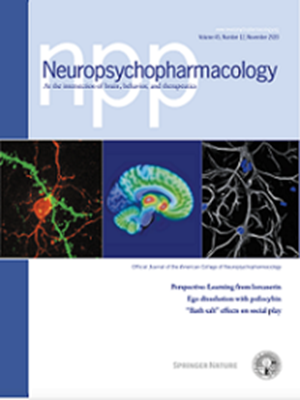吸烟与减少艾滋病毒感染者的神经炎症和更好的认知控制有关。
IF 6.6
1区 医学
Q1 NEUROSCIENCES
引用次数: 0
摘要
艾滋病毒感染者(HIV+)吸烟的可能性大约是一般人群的两倍。随着有效的抗逆转录病毒疗法的出现,了解慢性艾滋病毒感染和吸烟对脑功能和认知的影响变得越来越重要,因为即使采用这种疗法,艾滋病毒阳性个体也会加剧神经炎症和认知缺陷。基于先前的研究表明,吸烟减少了HIV-个体的神经炎症标志物,我们假设HIV+/吸烟+个体比HIV+/吸烟个体有更少的神经炎症和更好的认知控制。59名参与者(HIV-/Smok- [n= 16], HIV-/Smok+ [n=14], HIV+/Smok- [n= 18]和HIV+/Smok+ [n= 11])接受了基线资格测试,正电子发射断层扫描(PET)扫描以确定神经炎症标志物的水平,并通过反向翻译的5选择连续性能测试(5C-CPT)评估认知控制,吸烟者在测试前吸烟到饱腹。对于PET数据,发现吸烟状况对HIV+/吸烟+和HIV+/吸烟-参与者之间的全脑(WB)标准化摄取值(SUV)有显着影响(由于HIV+/吸烟+组的WB SUV低18.8%)。HIV+/吸烟参与者的WB SUV平均比HIV-/吸烟参与者高13.5%。对于5C-CPT, HIV+/ smoke +参与者的表现明显好于HIV+/ smoke -参与者(d prime), HIV+/ smoke -参与者的表现比HIV-/ smoke -参与者差。因此,HIV+/吸烟+个体比HIV+/吸烟-个体表现出更低水平的神经炎症标志物和更好的认知控制。考虑到HIV阳性个体的HIV得到很好的控制,仍然可能有慢性神经认知并发症,研究结果为未来研究尼古丁相关治疗方法提供了可能的途径,以预防此类并发症。本文章由计算机程序翻译,如有差异,请以英文原文为准。

Cigarette smoking is associated with reduced neuroinflammation and better cognitive control in people living with HIV
People living with HIV (HIV+) are roughly twice as likely to smoke cigarettes (Smok+) as the general population. With the advent of effective antiretroviral therapies, it is increasingly important to understand the effects of chronic HIV infection and cigarette smoking on brain function and cognition since HIV+ individuals have heightened neuroinflammation and cognitive deficits even with such therapies. Based on prior studies demonstrating that smoking reduces a marker for neuroinflammation in HIV- individuals, we hypothesized that HIV+/Smok+ individuals would have less neuroinflammation and better cognitive control than HIV+/Smok- individuals. Fifty-nine participants (HIV-/Smok- [n = 16], HIV-/Smok+ [n=14], HIV+/Smok- [n = 18], and HIV+/Smok+ [n = 11]) underwent baseline eligibility tests, positron emission tomography (PET) scanning to determine levels of a marker for neuroinflammation, and assessment of cognitive control with the reverse-translated 5-choice continuous performance test (5C-CPT), with smokers having smoked to satiety prior to testing. For the PET data, a significant effect of smoking status on whole brain (WB) standardized uptake value (SUV) was found between HIV+/Smok+ and HIV+/Smok- participants (due to 18.8% lower WB SUV in the HIV+/Smok+ group). HIV+/Smok- participants exhibited a mean 13.5% higher WB SUV than HIV-/Smok- participants. For the 5C-CPT, HIV+/Smok+ participants performed significantly better than HIV+/Smok- participants (d prime), and HIV+/Smok- participants performed worse than HIV-/Smok- participants. Thus, HIV+/Smok+ individuals demonstrated lower levels of the neuroinflammation marker and better cognitive control than HIV+/Smok- individuals. Given that HIV+ individuals whose HIV is well-controlled can still have chronic neurocognitive complications, study results suggest possible paths for future research into nicotine-related treatments to prevent such complications.
求助全文
通过发布文献求助,成功后即可免费获取论文全文。
去求助
来源期刊

Neuropsychopharmacology
医学-精神病学
CiteScore
15.00
自引率
2.60%
发文量
240
审稿时长
2 months
期刊介绍:
Neuropsychopharmacology is a reputable international scientific journal that serves as the official publication of the American College of Neuropsychopharmacology (ACNP). The journal's primary focus is on research that enhances our knowledge of the brain and behavior, with a particular emphasis on the molecular, cellular, physiological, and psychological aspects of substances that affect the central nervous system (CNS). It also aims to identify new molecular targets for the development of future drugs.
The journal prioritizes original research reports, but it also welcomes mini-reviews and perspectives, which are often solicited by the editorial office. These types of articles provide valuable insights and syntheses of current research trends and future directions in the field of neuroscience and pharmacology.
 求助内容:
求助内容: 应助结果提醒方式:
应助结果提醒方式:


